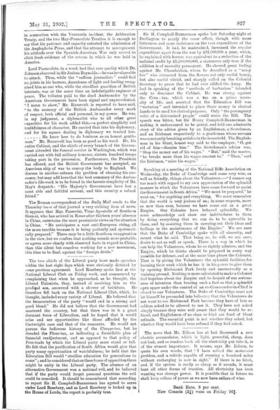Sir H. Campbell-Bannerman spoke last Saturday night at Darlington to
nearly the same effect, though with more bitterness and more insistence on the vast expenditure of the Government. It had, he maintained, increased the regular expenditure apart from the war by £31,000,000 a year, which, he explained with horror, was equivalent to a reduction of the national credit by 21,200,000,000, a statement only true if the addition is of necessity permanent. He showed great feeling against Mr. Chamberlain, whom ho described as a "noisy bee" who extracted from the flowers not only useful honey, but also useful vitriol, and sharply called on the Colonial Secretary to prove that he had ever vilified the Army. He had in speaking of the "methods of barbarism" intended only to denounce the Cabinet. He was strong against the Corn - tax, which was a tax on a prime neces- sity of life, and asserted that the Education Bill was "sectarian" and intended to place State money in clerical hands to be used for clerical purposes. Only " the peremptory voice of a determined people" could resist the Bill. The speech was bitter, but Sir Henry Campbell-Bannerman in making it endeavoured to be genial, and told one admirable story of the advice given by an Englishman, a Scotchman, and an Irishman respectively to a gentleman whose servant was constantly breaking articles in the household. The English• man in his blunt, honest way said to the employer, " 0, get rid of him—dismiss him." The Scotchman's advice was, " Stop the money out of his wages." " But," said the master, " he breaks more than his wages amount to." " Then," said the Irishman, " raise his wages."










































 Previous page
Previous page